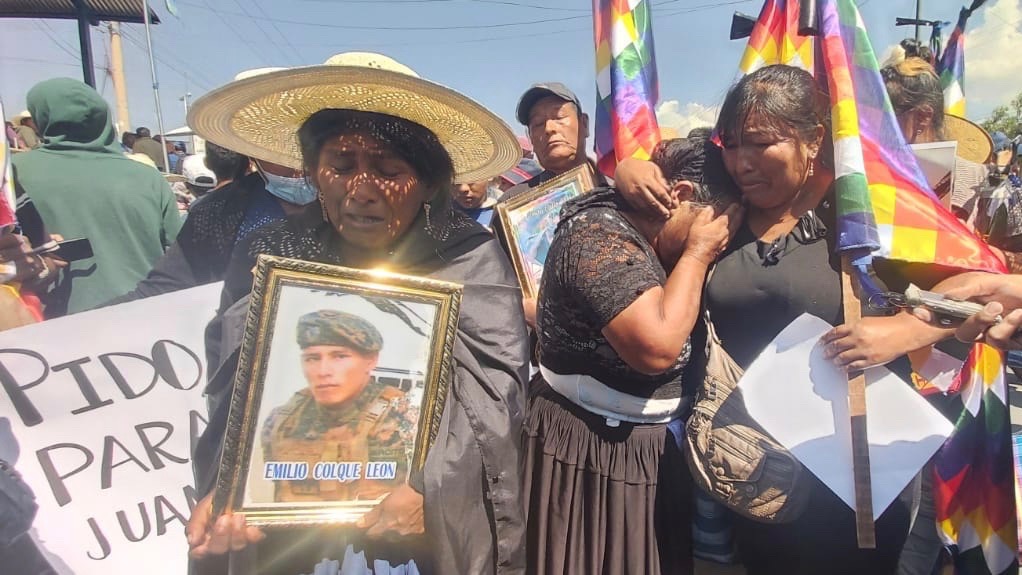This November 15 marked one year since the massacre in Sacaba city in the Cochabamba department of Bolivia. On the anniversary of the tragic incident, the families of the eleven victims, inhabitants of Sacaba, members of various human rights and social organizations took to the streets to pay tribute to the victims, demand justice for them and punishment for those responsible for their death.
Thousands of people marched to the Huayllani bridge in Sacaba, where a year ago Bolivian police and military forces killed eleven protesters who were part of a mobilization against the civic-military coup carried out against president Evo Morales and vice-president Álvaro García Linera on November 10, 2019. At the bridge, an altar with the photographs of the deceased was set up and at the foot of their photos funeral flower wreaths were placed.
Bolivia mark the 1 year anniversary of the Sacaba massacre. 11 protesters were executed here by the US-backed coup regime, helicopters shot at the crowd while flying at 40 metres from the ground.
Families are one step closer to justice, those responsible are being investigated. pic.twitter.com/HXQ19o6ase
— Kawsachun News (@KawsachunNews) November 15, 2020
The ombudswoman, Nadia Cruz, her representative in Cochabamba, Nelson Cox, the former coca-grower trade union leader and senator, Leonardo Loza, as well as members of the Office of the United Nations High Commissioner for Human Rights (OHCHR) attended the event. The members of the OHCHR called for a prompt and impartial investigation into the massacre, while the government officials assured that the newly elected government of President Luis Arce and vice-president David Choquehuanca would bring the perpetrators to justice.
Former president Evo Morales also sent his condolences to the families of the victims through his twitter account. “One year after the Sacaba Massacre, we demand justice for the brothers who have died. The State cannot leave these events unpunished, it must investigate, reestablish the truth and recognize the victims. Our solidarity with the families,” wrote Morales in a tweet.
What happened a year ago?
Following the US-backed coup against the democratically elected government of president Morales and the Movement Towards Socialism (MAS) party, hundreds of thousands of people began mobilizing across the country to resist the coup.
On November 15, 2019, Bolivian security forces brutally repressed one of such peaceful anti-coup marches by the Indigenous and peasant communities of Cochabamba. Soldiers and police officers fired tear gas canisters and live bullets at the crowd trying to march to the city of Cochabamba, killing eleven and gravely injuring more than a hundred protesters.
The disaster did not end there. On November 19, there was another massacre in the Senkata area of the El Alto city, located adjacent to the capital La Paz. The coup-installed government sent in helicopters, tanks and heavily armed soldiers to the Senkata gas plant, which residents of El Alto had blockaded as a measure of protest. The soldiers tear gassed residents, then shot firearms into the crowd, killing another dozen protesters and injuring another hundred.
Over the past year, Indigenous and peasant communities from across Bolivia denounced the coup-appointed president Jeanine Áñez and her interior minister, Arturo Murillo, for authorizing the use of deadly force against unarmed demonstrators as well as for promoting fascist, racist and patriarchal violence in the country.
According to the Inter-American Commission on Human Rights (IACHR), 36 people lost their lives in different regions of the country during various violent repression operations by security forces and confrontations between for and against coup supporters following the resignation of president Morales and the assumption of office by Áñez.
In an attempt to accelerate the justice process, on October 27, the members of the newly elected Plurinational Legislative Assembly approved the initiation of a liability trial against the former interim president and several of her former ministers to investigate the massacres of Sacaba and Senkata, among other incidents.
Additionally, yesterday, new justice minister Iván Lima announced that a mission from the IACHR would arrive in the country in the coming weeks to investigate all the incidents of human rights violations committed after the coup under Áñez’s rule.





